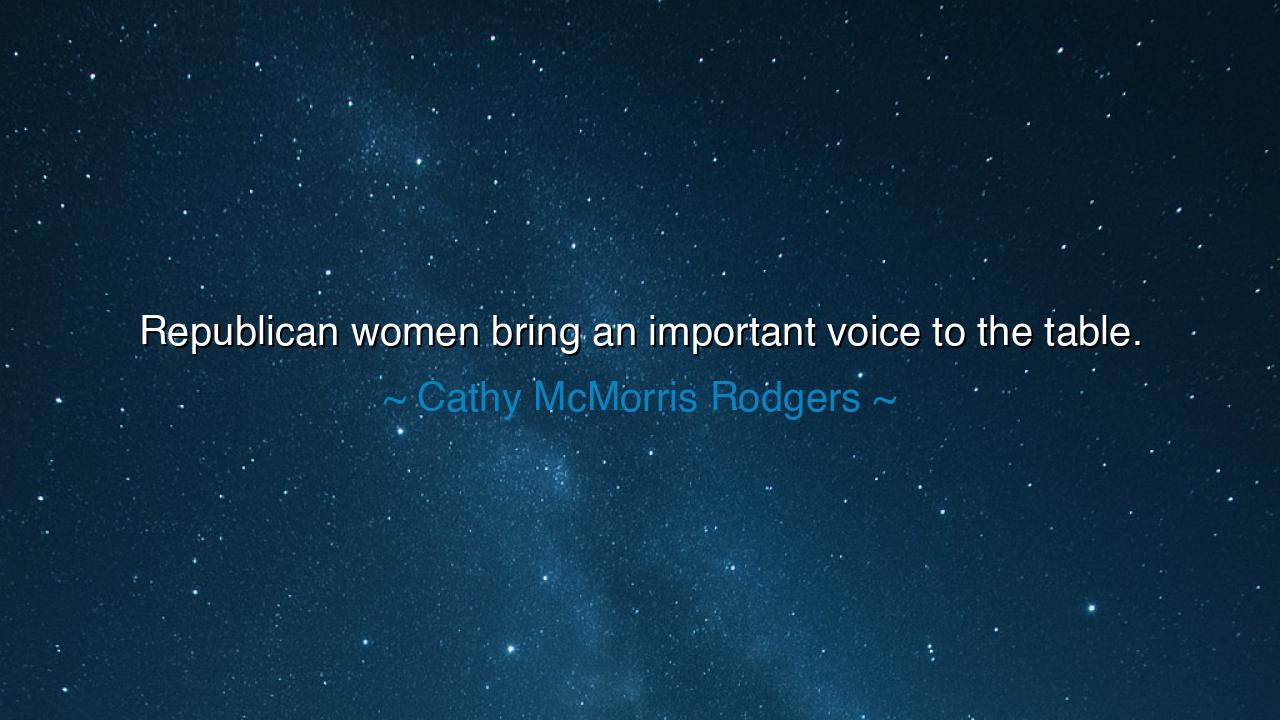
Republican women bring an important voice to the table.






When Cathy McMorris Rodgers declared, “Republican women bring an important voice to the table,” she spoke of presence, representation, and the necessity of balance in the realm of politics. Her words remind us that no gathering of leaders is complete when half the human race is silent or excluded. For the voice of women, sharpened by their experiences, shaped by their struggles, and strengthened by their resolve, is not an ornament to politics, but one of its essential pillars.
Her message reflects a deeper truth: every table of power reflects not only who sits there, but who is absent. In the halls of governance, men long spoke alone, fashioning laws without the wisdom of women’s perspectives. Rodgers affirms that when women, and particularly those in the Republican tradition, take their place, they enrich the conversation with a diversity of thought and experience that cannot be imitated. It is not merely their right, but their duty, to bring their voices forth.
The ancients too recognized the peril of leaving voices unheard. In Athens, though women were silenced in the Assembly, figures like Aspasia shaped thought from behind the scenes, proving that wisdom knows no gender. In Rome, Cornelia, mother of the Gracchi, molded her sons into reformers whose names live on in history. These women were denied seats at the table, yet their influence endured. Rodgers’ words mark the continuation of this truth: that women’s participation transforms politics into something fuller, more humane, more just.
History in America echoes the same. Before the passage of the Nineteenth Amendment, men governed alone, yet it was the unyielding determination of suffragettes that widened the table of democracy. Once women entered, they reshaped debates on education, labor, and family life, adding perspectives long ignored. To say that Republican women bring an important voice is to acknowledge that this process of widening representation continues in every generation.
Thus, let this lesson be passed down: no party, no movement, no nation can claim completeness without the voices of its women. Their contribution is not supplemental—it is transformative. And as Rodgers declares, when women bring their voice to the table, they do not simply join the discussion—they change its very nature, making it broader, deeper, and closer to the common good. This is the eternal law of justice: that every seat is diminished until all voices are heard.






T/Thanhtrip //
Cathy McMorris Rodgers is right in emphasizing the role of Republican women in political dialogue, but I also wonder: what does it take for women to truly have an equal voice at the table in any political party? Are Republican women often expected to adhere to certain party lines, or is there enough room for them to challenge and push for change within their own party? What are the barriers they face in asserting their influence?
LNLe ngan
While I agree with Cathy McMorris Rodgers’ statement, it’s important to consider the context in which women’s voices are valued in politics. What kind of impact do Republican women have on the policies and issues that affect other groups, like marginalized communities? Can their perspectives influence the broader political landscape in a way that challenges traditional power structures, or are they often confined to a narrow political agenda?
0G09.Huong Giang
It’s refreshing to hear Cathy McMorris Rodgers affirm the significance of Republican women in the political sphere. However, it raises the question of whether political parties, including the Republican Party, are doing enough to amplify women’s voices across the board. Are we seeing a growing recognition of women’s leadership in political discussions, or are they still fighting for a seat at the table in a male-dominated environment?
HPPhuc Hoang phuc
Cathy McMorris Rodgers is absolutely right that women in the Republican Party bring important voices to the table, but I think it’s essential to consider what specific contributions these women make. How does the Republican Party ensure that diverse viewpoints from women of different backgrounds (e.g., race, class, profession) are represented? Does it extend to issues that traditionally affect women, such as healthcare and family policies, or are there areas where their influence is more limited?
HVNguyen Thi Hong Van
I agree that Republican women, like women from any political background, have an important role to play in shaping conversations and policies. But I can’t help but wonder—how often are these voices given the space to be heard in the same way as their male counterparts? Are there particular challenges Republican women face in ensuring their perspectives are taken seriously within their own party and beyond?